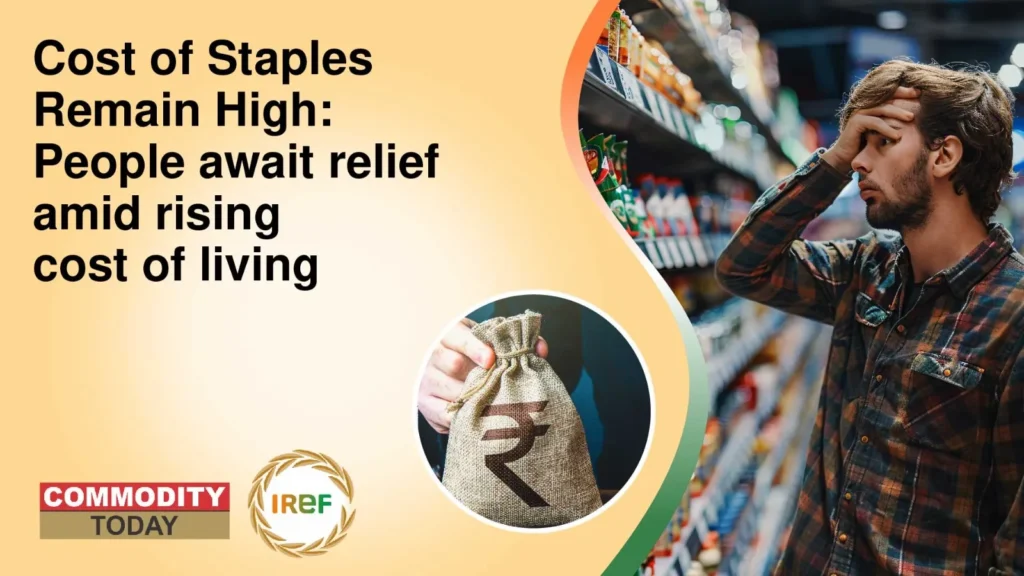Amid rising cost of living common people in Sri Lanka are now forced to question the President Anura Kumara Dissanayake as he approaches his first anniversary in office. Cost of staples like coconut, rice, and vegetables in Sri Lanka soaring high under the leadership of President Anura Kumara Dissanayake, people await relief. With food prices increasing, farmers, growers & common people are complaining about lack of relief from State.
Authorities Fail to Cut the High Cost of Living
Though the authorities promised to cut the high cost of living and ease household financial burdens, there is no sign of relief for people in Sri Lanka. With energy bills rising, food prices increasing common man is left with no short-term hope for relief from rising prices. Soaring prices of daily essentials like coconut, rice, and vegetables have left consumers frustrated and struggling to make ends meet.
Rising Costs of Daily Essentials
Inflation rate is high in Sri Lanka, according to Central Bank of Sri Lanka, from September 18, 2024, to September 18, 2025, the average price per kilogramme for nine daily or commonly consumed rose from Rs. 225 to Rs. 321.10, representing an overall increase of 42.7%.
Lime recorded the steepest surge with price increasing from Rs. 300/kg to Rs. 1,100/kg, a staggering 266.7% increase. Beans also climbed sharply, rising 60% from Rs. 250/kg to Rs. 400/kg. However, other vegetables recorded mixed trends. Carrot prices increased by 25%, while cabbage declined by 26%. Tomato and brinjal remained largely stable, whereas snake gourd and green chilli recorded declines of 20% and 15%, respectively.
“Imported Rice Cheaper than Local Varieties”
Local residents of Sri Lanka even said that imported rice is cheaper than local varieties. This revelation by local residents is quite confusing, as locals said that we are supposed to support local farmers, but price controls and high market rates make it hard for them to sell firmly. Fluctuating prices of vegetables and daily essentials are making it hard for people to feed their families. A resident on the terms of being anonymous said that “Coconut, coconut oil, and imported sprat are staples in our meals. When these increase in price, everything else feels insignificant because daily costs go up so fast. The Government says rice shortages will be managed, but every year it’s the same story. Popular varieties like keeri samba (a rice variety) jump in price and we end up paying far more than the official retail price. Promises rarely translate into real help.”
Coconut prices increased 34.6%, from Rs. 130 to Rs. 175, while coconut oil rose 30%, from Rs. 667 to Rs. 867. Imported potatoes climbed 20%, and imported sprat, a common protein source, surged 22.2%. These increases have a direct impact on household food expenses, particularly for low- and middle-income families.
Some Commodities Noted Relief as Well
Despite some relief in certain commodities, the overall scenario remains challenging. Prices of imported big onions fell 38.5%, dried chilli (imported) declined 15.7%, sugar dropped 17.3%, and eggs saw a modest decrease from Rs. 33.50 to Rs. 29.50 per egg.
Rice Prices Under Scrutiny
With food prices increasing, rice, the cornerstone of Sri Lankan diets, presents a mixed picture. Local samba rose by 2.04%, from Rs. 245 to Rs. 250 per kilogramme, and kekulu (white and red) increased 2.38%, from Rs. 210 to Rs. 215. Nadu remained unchanged at Rs. 230, while imported ponni samba fell 11.67%, from Rs. 300 to Rs. 265.
Govt. Initiatives for Improving Rice Varieties
Govt. in Sri Lanka is focusing on improving the quality of rice varieties for the international market and ensuring proper nutrition for crops. Minister of Agriculture, Livestock, Land, and Irrigation K.D. Lalkantha remarked that “We are currently using fertiliser recommendations from 2013. It is time to reassess whether these are suitable for our soil. We must all work together, considering this a national responsibility that goes beyond our individual professions.”



